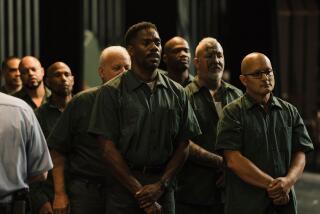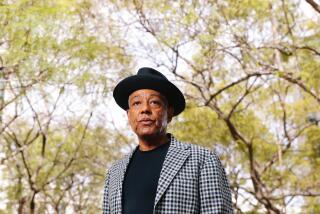Cradle of His Creativity
- Share via
Cockeyed pessimist, the ultimate niche marketer, Spalding Gray has made what he acknowledges in the new “Morning, Noon and Night” as a “good living” doing what he does. That is, through sheer hyperbolic, often riotous self-obsession; through living a little, often recklessly, and then talking about it a lot.
Not to say Gray isn’t also trying to make some sense of the world around him. In his new monologue, labeled a work-in-progress and continuing through the weekend at UCLA’s Schoenberg Hall, that world begins and ends with family--Gray’s own, the family he never really wanted--in Sag Harbor, Long Island, away from the compressed whir of New York City.
Gray’s previous solo, “It’s a Slippery Slope,” used skiing lessons as a way to deal with the meltdown between Gray and his longtime companion, Renee Shafranksy. This happened very quickly after their marriage; Gray left Shafransky for a woman he made pregnant. (All of which rendered the previous monologue, “Gray’s Anatomy,” pretty hollow.)
These days, Gray is Mr. Domesticity, living with Kathie--who from the sound of it does an awful lot of the cooking and cleaning. The blended family includes three children: Kathie’s 11-year-old daughter, Marissa, and two sons fathered by Gray--5-year-old Forrest and the infant, Theo.
At this developmental stage, “Morning, Noon and Night” wanders and lopes in its final third. Overall, it’s less structurally clever than either “Gray’s Anatomy” or “Slippery Slope.” When Gray leaves the main road for a detour, in the form of a flashback, the junctures often feel manufactured rather than natural. Yet much of the new solo is messier in a good way. Gray’s life, rife (at least when he’s not touring) with typical parental chaos and a proliferation of Power Rangers, has brought him face to face with new galaxies of anxiety. And satisfaction.
It’s a day-in-the-life piece, the day being Oct. 8, 1997, beginning with the sounds of National Public Radio’s “Morning Edition.” As Spalding and Kathie wake, feed the kids, take one to preschool, entertain another, attempt to make love with an infant and a Tickle Me Elmo perilously nearby, the details add up to a portrait of a monologuist as a family man.
As always, Gray’s best lines sing. He speaks of young Theo’s “perplexed scowl--the big ‘Why?’ ” Forrest, like most kids, has a lot of questions on his mind, among them: “Dad, how do flies celebrate?”
The material is the least exotic Gray’s ever dealt with, yet you get the impression that, for him, domesticity represents the last frontier, the true foreign territory, more so than Cambodia or anywhere else. What Gray does, he does craftily and well. As a diarist and a performer of his own stuff, he knows when to go for the joke (a couple of the longer, faster riffs seem designed for applause--and get it), and when to move in, stealthily, for the heartfelt kill.
I can’t be the only one in the universe who finds his work engaging and tiresome in roughly equal measure. He’s a wonderful wit, but there’s a disingenuous streak in many of his observations; here, you get the sense at times that he wants to be congratulated for simply having “settled down,” for accepting his familial responsibilities, albeit in a quaintly comfy, Volvo-ized setting.
A climactic conversation with Death (heard via boom box) reminds Gray to enjoy life, not worry about death, live in the moment, etc. etc. The children in his world remind of the same things, without the cliches. “Morning, Noon and Night,” which appears destined for the same widely traveled success as Gray’s previous major solos, finds the plaid shirt behind the desk plagued by the same old fears. But, he says, he’s learning to cope with the constants ruling us all: “Motion, transience, impermanency, change.”
* “Morning, Noon and Night,” UCLA’s Schoenberg Hall, Westwood. Thursday-Saturday, 8 p.m.; Sunday, 2 p.m. $10-$27. (310) 825-2101. Running time: 1 hour, 40 minutes.
More to Read
The biggest entertainment stories
Get our big stories about Hollywood, film, television, music, arts, culture and more right in your inbox as soon as they publish.
You may occasionally receive promotional content from the Los Angeles Times.










